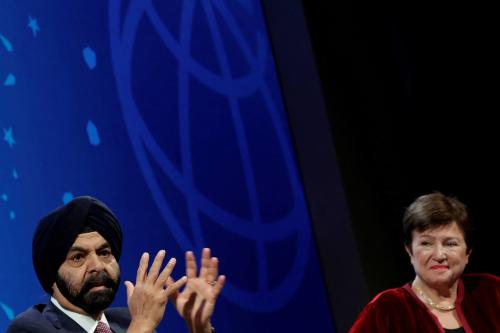The global financial crisis casts in high relief the need for global action. But the U.S. and the Europeans have been slow in dealing with the lack of domestic oversight, supervision and regulation of financial institutions. This reveals an astonishing reticence to assume public responsibility for financial stability, to hold private actors accountable and to insist on transparency in transactions that ultimately affect the public interest. There is now a belated and frantic crisis response in the U.S. and other major countries, but we do not yet see a global response to the global crisis, nor is there a serious debate about systemic institutional reforms necessary to prevent the next global crisis.
Public institutions need to be the vehicles by which leaders take public responsibility for the public interest. Otherwise, markets determine the public interest, which manifestly does not work, especially in finance.
The International Monetary Fund is in the doldrums, waiting for a new global mandate in the midst of a serious global financial crisis. Member governments have failed to act to give the IMF a role in coordinating national responses and institutional innovations to help remedy this financial crisis or prevent the next one. In their meetings at the end of this week, financial leaders need to act by either charging the IMF with a new and vigorous role or creating a new institution that can assume the role of steward of the global financial system.
Leaders in the United States must now recognize that systemic reform internally and externally go together because the domestic and the global dimensions of the financial crisis are inextricably linked. The institutional innovations necessary for successful U.S. reform depend on strengthening the capacity of international institutions to serve as focal points for collaboration, cooperation and exchange of best-practices required to shape effective national and global institutional innovations to exercise public responsibility. Without domestic and international reform now, in the wake of this severe crisis, the world is destined to repeat it.
When finance ministers and central bank presidents gather in Washington later this week, they must go beyond glib communiqués to convey to their publics that they have seen the damage, heard the outcries and are ready to act at home and globally. If they fail to give the International Monetary Fund a significant role in addressing the need for institutional reform nationally and internationally, then the IMF will cease to be the leading international institution in the global financial system.
If that happens, then one can only hope that the finance ministers of the group of ten industrial countries and ten largest emerging market economies, known as the G20, in their meeting in Brazil in mid-November will agree to a new mechanism: an ex-ante swap arrangement among themselves with a permanent secretariat that would assure effective transparency, oversight, supervision and regulation in their countries. Such a new mechanism would have the financial resources to act and the processes not only for enhanced consultation and cooperation, but also for peer pressure to correct weak practices.
It would be much preferred for the IMF to carry out this secretariat function, but member governments must direct it, not ignore it. If they do not, because they do not think the IMF is up to the job, then some other mechanism needs to be created that can act and coordinate, and that can be a visible focal point for assuring publics that their interests are being asserted in the financial markets, not left entirely to the whims of market forces.
U.S. indulgence in laissez-faire capitalism has long been unpopular in much of the rest of the world, and the current crisis reveals how the promotion of an under-regulated financial system combined with poor macroeconomic management will backfire. Asia learned this lesson a decade ago with its own financial crisis. Having been constrained at that time by the IMF, backed by the U.S. Treasury, from adopting the kind of financial rescue operations now widely implemented in the US and Europe, Asians lost faith in the IMF, in which they never had the voice and vote commensurate with their economic weight.
Only if the U.S. and the Europeans are willing to let the IMF – or a new global financial institution, if need be – assume a lead role in the financial system, with a pragmatic approach which balances a free market with effective regulatory oversight, will we see the much needed coordination of national and international global crisis response and long term systemic financial reforms that can provide for global financial stability in the future. Of course, this will also require a more fundamental rebalancing of the governance of the IMF or its replacement, giving the large emerging market economies a clear role and stake commensurate with their much expanded economic and financial strength. The bottom line is this: the global financial system needs a credible steward. U.S. and European leaders must realize that this time of crisis is the right moment to create it.


Commentary
Op-edA Message for the Ministerial Meetings: Reform the IMF or Create a New Global Agency, But Do Something
October 9, 2008